



Achieving new frontiers through trypanosomatid exosomes (TEx)) (Transformar o potencial dos exossomas de tripanossomatideos em novas oportunidades (TEx)) –
- EXOTRYPANO Refª PTDC/CVT-CVT/28908/2017
Instituto de Higiene e Medicina Tropical (IHMT), Universidade Nova de Lisboa (UNL), Lisbon, Portugal
Faculdade de Medicina Veterinária (FMV), CIISA–Centro de Investigação Interdisciplinar em Sanidade Animal, Universidade de Lisboa (ULisboa), Lisbon, Portugal,
Health Sciences Centre/Federal University of Rio Grande do Norte (UFRN, Natal, Brazil)
Do you want to reach us? Please contact:
Prof. Gabriela Santos-Gomes | santosgomes@ihmt.unl.pt
Global Health and Tropical Medicine, GHTM, Instituto de Higiene e Medicina Tropical, IHMT, Universidade Nova de Lisboa, UNL, Rua da Junqueira 100, 1349-008 Lisbon, Portugal
Prof. Isabel Pereira da Fonseca | ifonseca@fmv.ulisboa.pt
CIISA, Centre for Interdisciplinary Research in Animal Health. Faculty of Veterinary Medicine, University of Lisbon, Av. Universidade Técnica, 1300-477 Lisbon, Portugal
Prof. Marcelo Silva | mssilva.ufrn@gmail.com
UFRN, Universidade Federal do Rio Grande do Norte, Campus Universitário - Lagoa Nova, Natal - RN, 59078-970, Brazil
Gabriela Santos Gomes - PhD
Sofia Gabriel - MSc *
Setshego Phokoje - MSc * **
Ana Valério-Bolas - PhD *
Joana Palma-Marques - fellowship
Lis Lobo – fellowship
Armanda Rodrigues - Pos-doctoral researcher, PhD
Juliana Weber - MSc*
George Nakhratyan - MSc*
Flávia Martins - MSc*
Bruna Freitas - MSc*
Maria Pereira - PhD
Mafalda Meunier - MSc*
* student
** Former Member
Isabel Fonseca - DVM, PhD
Graça Alexandre-Pires - DVM, PhD
José Meireles - DVM, PhD
Marcos Santos - PhD
Joana Gomes - DVM
Ana Reisinho - DVM, MSc
Alexandra Basso - DVM
Marcelo Silva - PhD
Cláudia Moreno - Post-Doc
Felipe Anderson - PhD *
Johny Oliveira - PhD *
Alzira Regina - PhD *
Aline Maria Queiroz - PhD *
Sílvia Donato - PhD * **| IHMT/UFRN
Annamairlla Oliveira - MSc *
Kyvia Varela - MSc *
Rosana Macedo - MSc *
Joice C. Branco - MSc *
Celisa Tavares - MSc *
* student
** Former Member
Rodrigues AV, Valério-Bolas A, Alexandre-Pires G, Aires Pereira M, Nunes T, Ligeiro D, Pereira da Fonseca I, Santos-Gomes G. 2022. Zoonotic Visceral Leishmaniasis: New Insights on Innate Immune Response by Blood Macrophages and Liver Kupffer Cells to Leishmania infantum Parasites. Biology. 11(1):100. https://doi.org/10.3390/biology11010100
Available at:
https://www.mdpi.com/2079-7737/11/1/100/htm
Dias-Guerreiro, Tatiana, Joana Palma-Marques, Patrícia Mourata-Gonçalves, Graça Alexandre-Pires, Ana Valério-Bolas, Áurea Gabriel, Telmo Nunes, Wilson Antunes, Isabel P.d. Fonseca, Marcelo Sousa-Silva, and Gabriela Santos-Gomes. 2021. "African Trypanosomiasis: Extracellular Vesicles Shed by Trypanosoma brucei brucei Manipulate Host Mononuclear Cells" Biomedicines 9, no. 8: 1056. https://doi.org/10.3390/biomedicines9081056
Available at:
https://www.mdpi.com/2227-9059/9/8/1056/htm
Alexandre-Pires G, Santos M, Rodrigues A, Pereira MA, Gomes J, Diaz SA, Gomes L, Basso A, Reisinho A, Gomes J, Leal R, Correia J, Bolas A, Meireles J, Santos-GomesI G, and Pereira-da-Fonseca I . 2020. Leishmaniosis: New Insights in a Changing World. In: Freitas Duarte A., Lopes da Costa L. (eds) Advances in Animal Health, Medicine and Production. Springer, Cham. https://doi.org/10.1007/978-3-030-61981-7_17
Available at: https://link.springer.com/chapter/10.1007/978-3-030-61981-7_17
Santos MF, Alexandre-Pires G, Pereira MA, Gomes L, Rodrigues AV, Basso A, Reisinho A, Meireles J, Santos-Gomes GM and Pereira da Fonseca I. 2020. Immunophenotyping of Peripheral Blood, Lymph Node, and Bone Marrow T Lymphocytes During Canine Leishmaniosis and the Impact of Antileishmanial Chemotherapy. Front. Vet. Sci. 7:375. doi.org/10.3389/fvets.2020.00375
Available at: https://www.frontiersin.org/articles/10.3389/fvets.2020.00375/full
Rodrigues AV, Alexandre-Pires G, Valério-Bolas A, Santos-Mateus D, Rafael-Fernandes M, Pereira MA, Ligeiro D, Nunes T, Alves-Azevedo R, Santos M, Pereira da Fonseca I, Santos-Gomes G. 2020. 3D-Hepatocyte Culture Applied to Parasitology: Immune Activation of Canine Hepatic Spheroids Exposed to Leishmania infantum. Biomedicines. 18;8(12):628. doi: 10.3390/biomedicines8120628.
Available at:
https://www.mdpi.com/2227-9059/8/12/628/htm
Pereira M, Valério-Bolas A, Saraiva-Marques C, Alexandre-Pires G, Pereira da Fonseca I, Santos-Gomes G. 2019. Development of Dog Immune System: From in Uterus to Elderly. Vet Sci. 2019;6(4):83. doi:10.3390/vetsci6040083
Available at:
https://www.mdpi.com/2306-7381/6/4/83/htm
Gabriel Á, Valério-Bolas A, Palma-Marques J, Mourata-Gonçalves P, Ruas P, Dias-Guerreiro T, Santos-Gomes G. 2019. Cutaneous Leishmaniasis: The Complexity of Host's Effective Immune Response against a Polymorphic Parasitic Disease. J Immunol Res. 2019;2019:2603730. doi: 10.1155/2019/2603730
Available at: https://www.hindawi.com/journals/jir/2019/2603730/
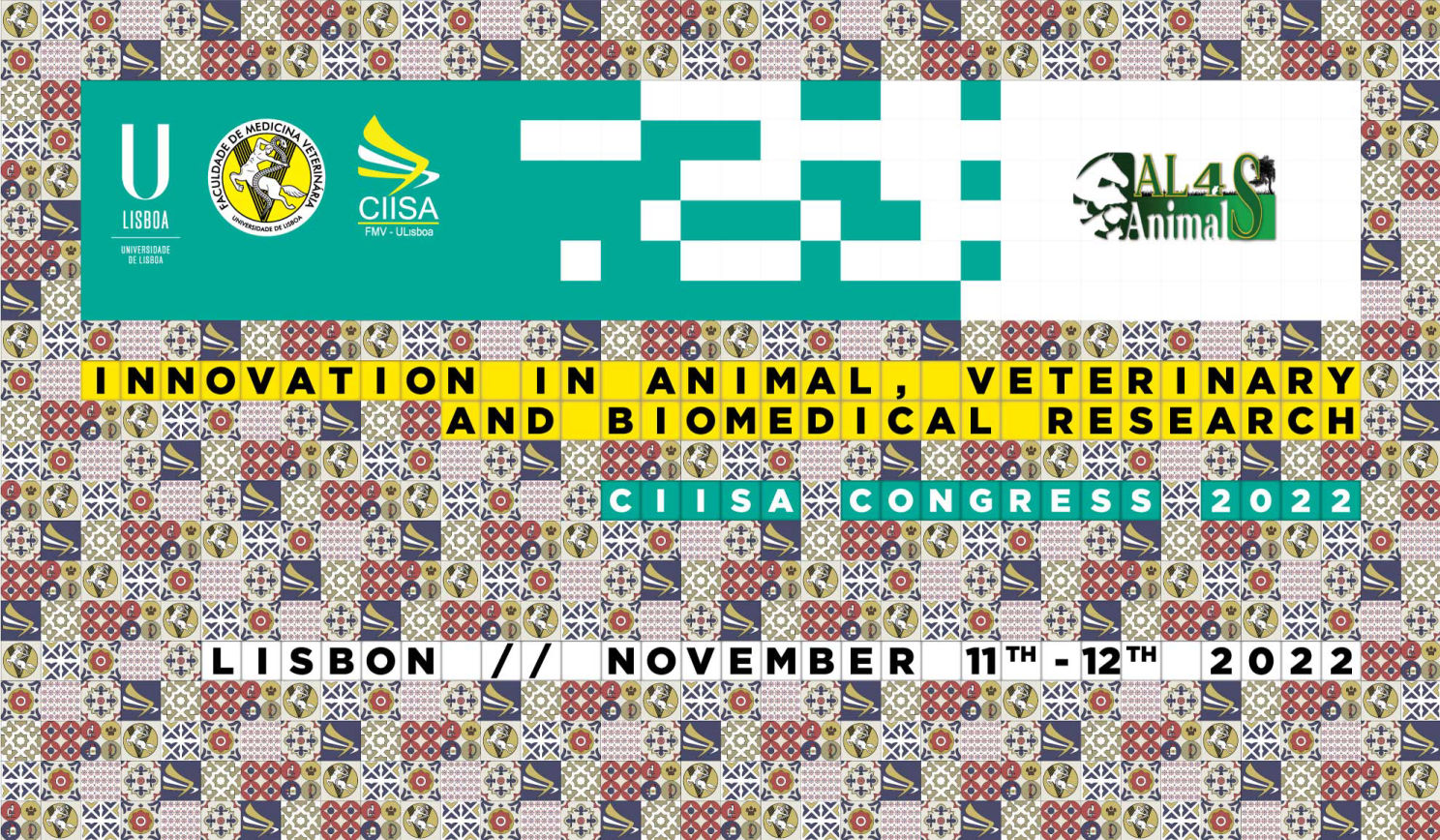
EXOTRYPANO team has also participated in the CIISA Congress 2022, FMV, Lisbon 11th-12nd November 2022, presenting the poster Canine Leishmaniosis: exploring the activity of dendritic cells from dogs under different antileishmanial prophylaxis strategies. Marta Monteiro, Ana Valério-Bolas, Mafalda Meunier, Armanda Rodrigues, Graça Alexandre-Pires, Rodolfo Leal, Gabriela Santos-Gomes, Isabel Pereira da Fonseca. Poster 131.
More information at:
https://congressociisa.fmv.ulisboa.pt
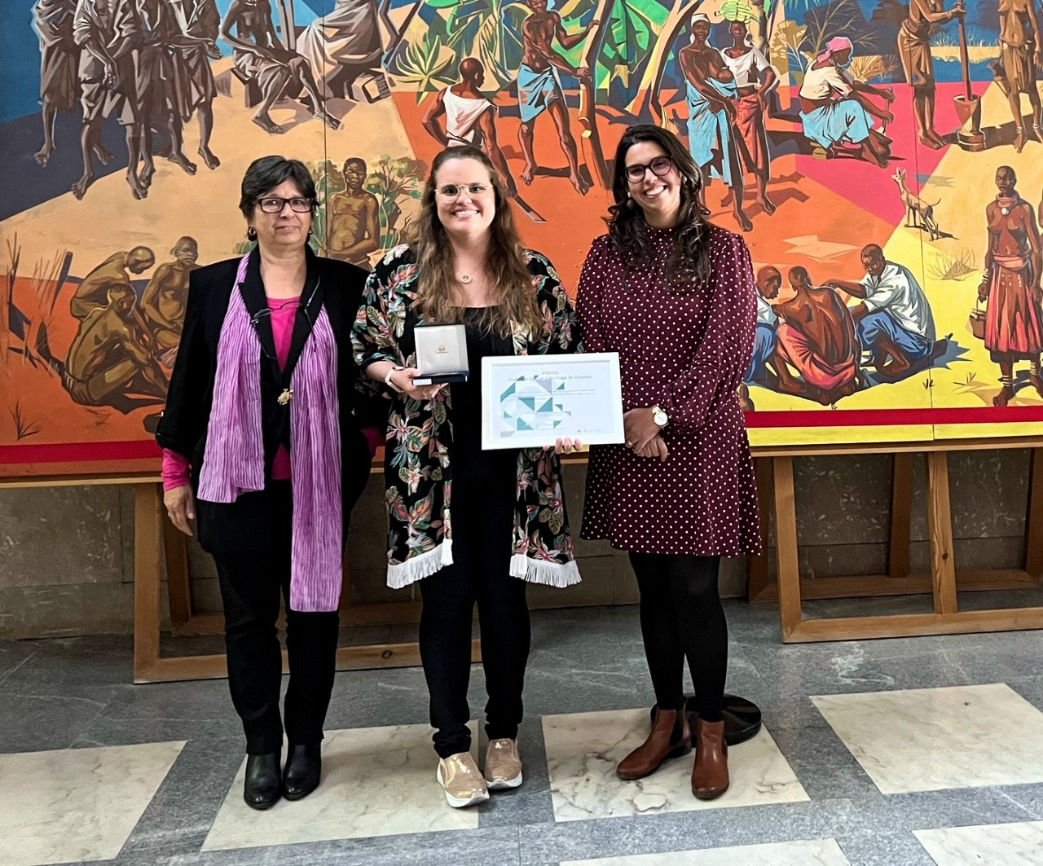
Julina Weber received the Professor Doutor João Fraga de Azevedo award for the medical parasitological area for her master thesis work “Efeito da vesiculas extracelulares de espécies cutâneas de Leishmania em macrófagos de murganho”. The ceremony took place on 4th November 2022 at Instituo de Higiene e Medicina Tropical (IHMT).
For more information see:
https://www.ihmt.unl.pt/abertura-solene-do-ano-letivo-2022-23-directo-no-youtube
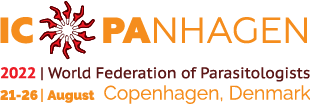
EXOTRYPANO team has participated in the ICOPA meeting that took place in Copenhagem on the 21-26 August 2022, with the work “Cutaneous leishmaniasis: exploring Leishmania sp. Extracellular vesicles as immunomodulators of host skin immune system”. The work was presented by Armanda Rodrigues, in collaboration with George Nakhratyan, Juliana Weber, Graça Alexandra-Pires, Ana Valério-Bolas, Telmo Nunes, Isabel Pereira da Fonseca and Gabriela Santos-Gomes.
More information at:
https://icopa2022.org
EXOTRYPANO team has participated in the 3rd International Caparica Conference on Leishmaniasis 2022, 24th- 26th October in Costa de Caparica, Portugal. The work intitled “Liver involvement in canine visceral leishmaniasis: an immunological perspective” was presented by Armanda Rodrigues, in collaboration with Graça Alexandr-Pires, Ana Valério-Bolas, Maria Aires-Pereira, Telmo Nunes, Isabel Pereira da Fonseca and Gabriela Santos-Gomes.
More information at:
https://www.leishmaniasis2022.com
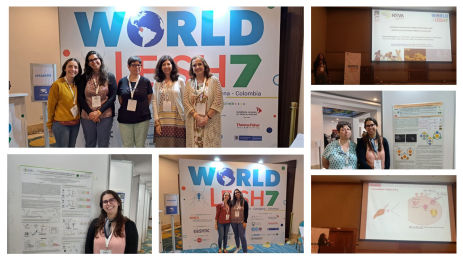
Project team members Gabriela Santos-Gomes, Armanda Rodrigues from IHMT and Isabel Pereira da Fonseca, Graça Alexandre Pires and Marta Monteiro from FMV have participated in the international WORLDLEISH 7 Congress in Cartagena, Colombia from 1st to 6th of August 2022.
Abstracts available at:
https://www.worldleish7.org/scientificprogram
WORLDLEISH 7 is an international Congress dedicated to Leishmania and Leishmaniasis, addressing this neglected tropical disease by joining together researchers from all over the world and from all disciplinary areas to share last discoveries and exchange new ideas.
See more information at:
http://worldleish.org/wp
List of the works presented by the team:
LEISHMANIA INFANTUM AND CANINE MACROPHAGES: NEW INSIGHTS ON HOST-PARASITE IMMUNE CO-EVOLUTION Armanda Rodrigues, Ana Valério-Bolas, Graça Alexandre-Pires, Maria A. Pereira, Telmo Nunes, Dário Ligeiro, Isabel Pereira da Fonseca, Gabriela Santos-Gomes. Oral presentation. ID: 100253
CYTOKINE GENE EXPRESSION AND LYMPHOCYTE IMMUNOPHENOTYPING IN DOGS WITH LEISHMANIOSIS. Marcos Santos, Marta Monteiro, Ana Valério-Bolas, Graça Alexandre-Pires, Maria A. Pereira, Armanda V. Rodrigues, Gabriela Santos-Gomes, Isabel Pereira da Fonseca. Oral presentation. ID: C025-05. Pg. 357.
EFFECT OF EXTRACELLULAR VESICLES SHEED BY LEISHMANIA SHAWI ON IMMUNOMODULATION OF MURINE MACROPHAGES. Juliana Inês Weber; Maria Armanda Rodrigues; Ana Valério-Bolas; Manuela Colla Carvalheiro; Graça Alexandre-Pires, Wilson Talhão Antunes, Isabel Pereira da Fonseca; Gabriela Santos-Gomes. Oral presentation. ID: 100257
EXTRACELLULAR VESICLES OF LEISHMANIA AMAZONENSIS: ACTIVATION OF MURINE MACROPHAGES AND ANTIGENICITY. Bruna Eugênia de Freitas, Armanda Viana Rodrigues, Joana Palma-Marques, Ana Valério-Bolas, Rodrigo Pedro Soares, Graça Alexandre-Pires, Isabel Pereira da Fonseca, Hélida Monteiro de Andrade, Gabriela Santos-Gomes. Poster presentation. ID: 100317
ANALYSIS OF LEISHMANICIDAL AND IMMUNOMODULATORY ACTIVITY OF NATURAL AND SYNTHETIC PRODUCTS. Raíssa Couto Santana, Maria Armanda Viana Rodrigues, Afonso Santine Magalhães Mesquita Velez, Marco Edilson Freire de Lima, Debora Decoté-Ricardo, Celio Geraldo Freire-de-Lima, Lucia Helena Pinto da Silva, Gabriela Santos-Gomes. Poster presentation. ID: 100703
CONNECTING THE DOTS: A CARTOON NETWORK THAT PEEKS INTO LEISHMANIA SPP. INFECTION AND EVASION. Beatriz Pratas Martins, Maria Pereira, Telmo Nunes, Armanda Rodrigues, Wilson Talhão Antunes, Ana Valério-Bolas, Juliana Weber, Bruna Freitas, Isabel Pereira da Fonseca, Gabriela Santos-Gomes, Graça Alexandre-Pires. Poster presentation. ID: 100312
LEISHMANIA INFANTUM INFECTION IN EXOTIC PETS LIVING IN METROPOLITAN AREA OF LISBON, PORTUGAL: WHAT DO WE KNOW? Vera Laranjo, Sara Zúquete, Mariana Bernardino, Susana Azinheira, Gabriela Santos-Gomes, Isabel Pereira da Fonseca. Poster presentation. ID: P4-079. Pg. 1445.
MOLECULAR AND SEROLOGICAL SURVEY OF LEISHMANIA INFANTUM IN WILD LEPORIDAE FROM MAINLAND PORTUGAL. Marta Alves, Jacinto Gomes, Fábio Abade dos Santos, Carina Carvalho, Margarida Duarte, Isabel Pereira da Fonseca. Poster presentation. ID: P4-080. Pg. 1447.
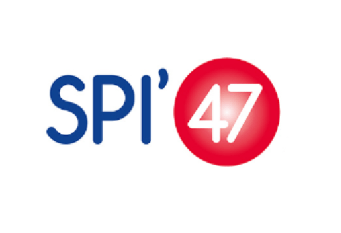
EXOTRYPANO team has participated in the XLVII anual meeting of the Portuguese Society for Immunology (SPI), Lisbon 20th-22nd April 2022, presenting the poster "Extracellular vesicles: evolving the therapeutics of tomorrow for Leishmaniasis". The work was presented by Armanda Rodrigues, in collaboration with Juliana Weber, Graça Alexandra-Pires, Ana Valério-Bolas, Wilson Talhão Antunes, Telmo Nunes, Isabel Pereira da Fonseca and Gabriela Santos-Gomes.
More information at https://www.spimunologia.org/news/spi-2022
1st seminar on “New approaches to tackle trypanosomiasis” to be hosted by IHMT, as a World Health Organization (WHO) Collaborative Centre (CCol), predicted to take place in 2022. More information soon.
The EXOTRYPANO Team has new publications, available in open access:
Rodrigues AV, Valério-Bolas A, Alexandre-Pires G, Aires Pereira M, Nunes T, Ligeiro D, Pereira da Fonseca I, Santos-Gomes G. 2022. Zoonotic Visceral Leishmaniasis: New Insights on Innate Immune Response by Blood Macrophages and Liver Kupffer Cells to Leishmania infantum Parasites. Biology. 11(1):100. https://doi.org/10.3390/biology11010100
Available at: https://www.mdpi.com/2079-7737/11/1/100/htm
Dias-Guerreiro, Tatiana, Joana Palma-Marques, Patrícia Mourata-Gonçalves, Graça Alexandre-Pires, Ana Valério-Bolas, Áurea Gabriel, Telmo Nunes, Wilson Antunes, Isabel P.d. Fonseca, Marcelo Sousa-Silva, and Gabriela Santos-Gomes. 2021. "African Trypanosomiasis: Extracellular Vesicles Shed by Trypanosoma brucei brucei Manipulate Host Mononuclear Cells" Biomedicines 9, no. 8: 1056. https://doi.org/10.3390/biomedicines9081056
Available at: https://www.mdpi.com/2227-9059/9/8/1056/htm
Post-doctoral researcher Claudia Jassica Gonçalves Moreno, member of the EXOTRYPANO TEAM (UFRN) has won a honourable mention on Capes 2021 edition “ Prêmio de Teses da Coordenação de Aperfeiçoamento de Pessoal de Nível Superior (Capes) da edição 2021”. Claudia was supervised by professor Marcelo de Sousa da Silva.
More information at: https://ufrn.br/imprensa/noticias/50772/cinco-teses-da-ufrn-sao-premiados-pela-capes
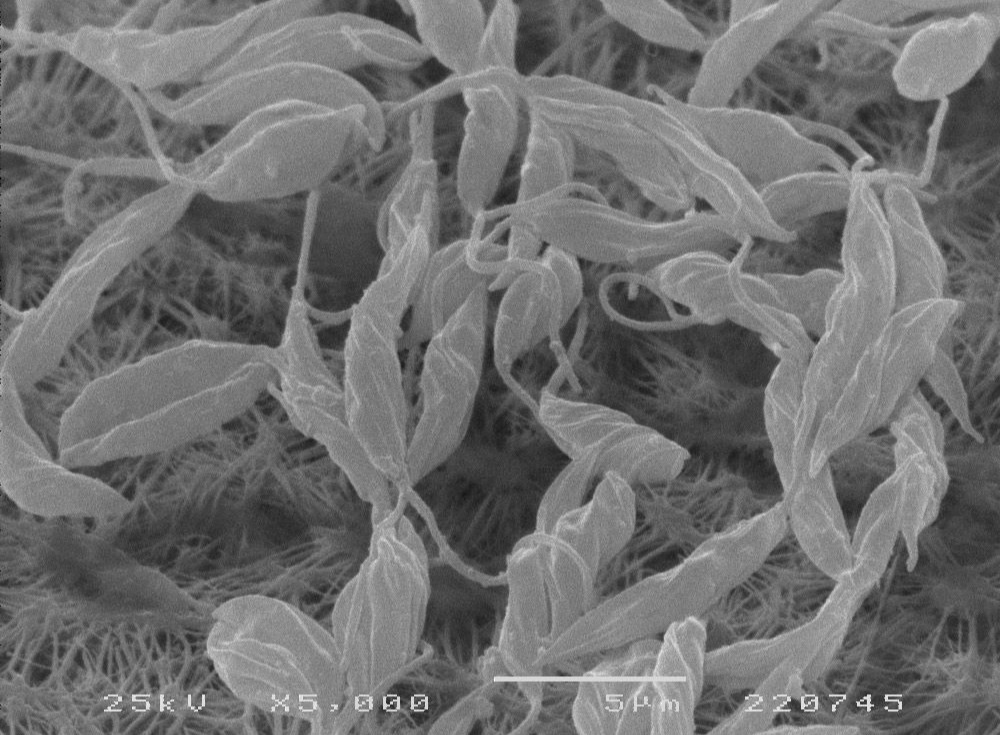
Leishmania shawi promastigotes. Scan electron microscopy (SEM) image. The parasite has an elongated body and a visible flagellum (Alexandre-Pires, G.)
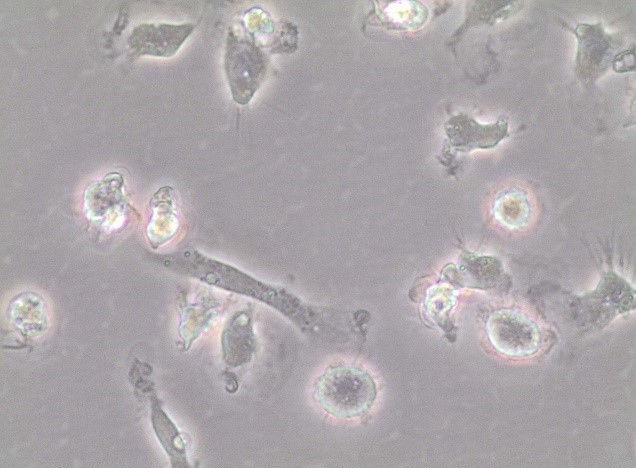
Canine blood-macrophages (magnification 400x). Optical microscopy with no staining. (Rodrigues, MA).
EXOTRYPANO is a Portugal-Brazil partnership research project raised to decipher the communication established by extracellular nanovesicles shed by trypanosomatids with host immune cells in the next three years.
EXOTRYPANO brings together renowned experts of three academic institutions from Portugal, IHMT-NOVA and FMV-ULisboa (Lisbon), and from Brazil, UFRN (Natal, RGN) This interdisciplinary project will explore the mechanisms used by extracellular nanovesicles emitted by Leishmania, Trypanosoma cruzi, and Trypanosoma brucei to influence the host immune response. This research project aims to contribute to improving treatment and control of Leishmaniasis, Chagas Disease, and African trypanosomiasis, which are parasitic diseases that afflict human populations and animals across the globe, especially in Africa and South America. The Portuguese Foundation for Science and Technology (FCT) supports the activities of this academic research initiative.

Vector-borne parasitic diseases significantly affect the well-being of millions of people around the globe, especially in low-income countries, posing a substantial burden to healthcare systems, and also causes disease in domestic and wild animals. African human
trypanosomiasis or sleeping sickness and African animal trypanosomiasis or nagana caused by T. brucei are found in the sub-Sahara region. This animal parasitic disease, which affects cattle, is recognized as a major obstacle for economical development. In Central and South America, T. cruzi causes American trypanosomiasis or Chagas disease in humans, wild and domestic animals, including dogs and cats, is a major public health problem. Currently, this neglected tropical disease is spreading to other areas, constituting an emerging disease of global concern. Presenting a worldwide dispersion, with the exception of Australia, the Pacific Islands, and Antarctica, Leishmaniasis is caused by Leishmania also transmitted by blood-sucking arthropods, affecting humans and canids, especially dogs. For these neglected diseases, mainly associated with poor living conditions therapy has long been a challenge and prophylactic vaccines have only become available for canine leishmaniasis.
EXOTRYPANO integrates cellular and immune methodologies as well as transcriptomic and high-throughput image technology to identify the relationship between trypanosomatid extracellular vesicles and host immune. All data generated within this project will be centralized, enabling detailed and comprehensive bioinformatics and biostatistics analyses.
EXOTRYPANO intends to increase the fundamental knowledge on the molecular pathways tackled by trypanosomatid extracellular vesicles in parallel in three parasitic diseases; Leishmaniasis, American Trypanosomiasis or Chagas disease and African Trypanosomiasis (sleeping sickness and nagana). A common pattern on the effect of parasite extracellular nanovesicles may be found across these diseases, indicating that they may share immunopathogenic pathways, identifying biomarkers that can help in improving patient management and disease prevention.
EXOTRYPANO activities were formally open with a launching meeting that took place at IHMT-NOVA (Lisbon, Portugal) on January 29, 2020.
